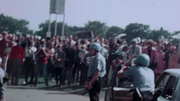
The 1968 Democratic National Convention protests occurred in Chicago, Illinois from 23 to 28 April 1968 during the Democratic National Convention. Since 1967, New Left and counterculture protesters had made plans to disrupt the convention to protest President Lyndon B. Johnson's policies during the Vietnam War. 15,000 protesters gathered in Chicago to register their anguish over the war. Mayor Richard J. Daly was determined that there be no trouble in his city, and 12,000 Chicago policemen were on alert, as were 6,000 US Army troops, 6,000 armed US National Guardsmen, and 1,000 CIA, FBI, and military intelligence agents. Daly cordoned off the Chicago Amphitheatre where the convention was held, and also refused to give permits to the protesters to protest or sleep in the parks; antiwar activist Rennie Davis claimed that the tens of thousands of protesters constituted a permit.
Vice President Hubert Humphrey was the frontrunner at the Convention; he was a hero to his party's liberal wing, but his loyalty to Johnson during the war led to the protesters and the antiwar delegates in the hall backing his rival Eugene McCarthy. That night, the police drove the protesters out of Lincoln Park with clubs and tear gas. The next afternoon, the Democrats had a heated debate about adding an antiwar plank to the party platform. When the Humphrey delegates voted it down, the Democratic delegates demonstrated inside of the amphitheatre. Meanwhile, riots broke out after a young man was arrested for attempting to tear down an American flag, and the police, mostly working-class Italian, Polish, or Irish policemen who either served in the Vietnam War or had relatives who did, brutally cracked down on the protesters. The protesters committed vandalism and yelled obscenities, and several policemen were enraged by their abuse of their privileges and beat them down. That evening, thousands of demonstrators marched on the Democratic headquarters at the Hilton Hotel on Michigan Avenue. At Balbo and Michigan, the police and National Guard put down a peace demonstration. At the Convention, there was more confusion as some antiwar delegates once pledged to the murdered Robert F. Kennedy supported another candidate, South Dakota senator George McGovern. Johnson considered flying to Chicago and getting back in the race himself, and, while Daly told him that he would have enough delegates to win the nomination, the Secret Service told him that he could not fly there, as there was too great a security risk. In the end, Humphrey won the nomination on the first ballot, although he was heartbroken by the unrest during the convention. Ultimately, the riots left 500+ protesters, 100+ other civilians, and 152 police officers injured. A presidential commission declared the events to be a "police riot", but, in a Gallup poll, 56% of Americans approved the police's response. When the Republican nominee Richard Nixon chose to begin his presidential campaign with a motorcade through the Chicago Loop, 500,000 Chicagoans turned out to cheer him.
